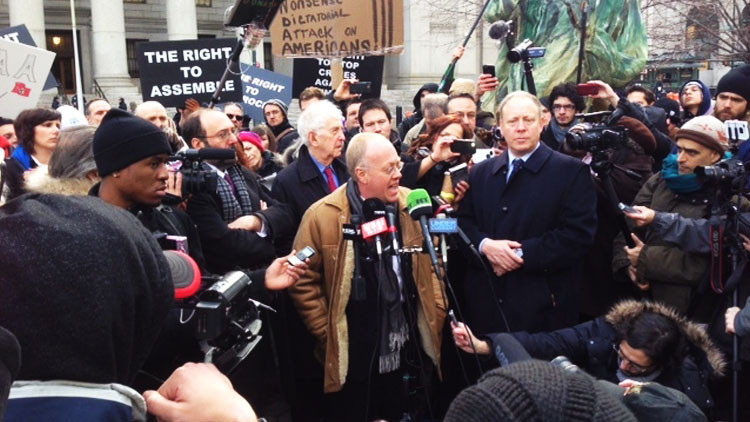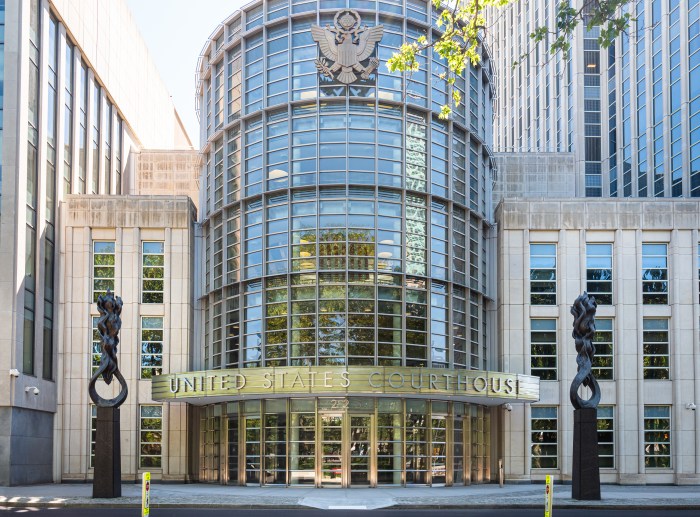A group of journalists and activists who filed a lawsuit two years ago challenging a controversial provision in a national defense spending bill that they claimed allows for the indefinite detention of U.S. citizens were dealt a crushing blow Monday when the U.S. Supreme Court declined to hear their appeal.
In declining to hear the case, the highest court in the land effectively killed the lawsuit—Hedges V. Obama—which was brought by famed former New York Times reporter and Pulitzer Prize-winner Chris Hedges, Pentagon Papers whistleblower Daniel Ellsberg, renowned linguist Noam Chomsky, plus four others. Collectively, the plaintiffs were dubbed “The Magnificent Seven” by supporters.
The decision upholds the U.S. Second District Court of Appeals July 2013 decision to vacate a permanent injunction on its implementation, which was previously issued by a President Obama-appointed U.S. District Court Judge in September 2012. In her decision, Judge Katherine Forest, ruled Section 1021 of the 2012 National Defense Authorization Act unconstitutional. The Obama Administration appealed Forest’s ruling the very next day.
In a Facebook post Monday, Tangerine Bolen, founder of nonprofit whistleblower advocacy group RevolutionTruth and one of the plaintiffs in the suit, blasted the court for recent decisions defining corporations as “persons” and stripping regulations limiting campaign donations while at the same time limiting the rights of “living, breathing people.”
“We are no longer a nation ruled by laws,” she wrote. “We are nation ruled by men who have so steeped themselves in a false narrative that at the same time they are exponentially increasing the ranks of terrorists, they are destroying the rule of law itself. It is madness upon madness—the classic tale of becoming the evil you purport to fight while believing you remain righteous.”
Hedges and others had sought a permanent injunction of the provision, arguing that it violated the First and Fifth Amendments.
They also claimed that the provision gives the executive branch full authority to militarily detain people suspected of providing “substantial and/or direct support” to terrorists until the end of hostilities, which according to the provision, is lawful under the Authorization for Use of Military Force (AUMF)—enacted three days after the Sept. 11, 2001 attacks.
Hedges took the Obama Administration to court because, in part, he argued that the terminology—“covered persons”—used in the bill was overbroad, adding that it could be cited to detain journalists reporting on groups hostile to the United States.
“The deterioration of civil liberties under the Obama administration has complete continuity with the attack on civil liberties under the Bush administration,” Hudges told hundreds of supporters last year outside the Second Circuit Court of Appeals in Manhattan following oral arguments. “In fact, under the Obama administration it has been worse. The radical interpretation of the 2001 Authorization to Use Military Force Act [AUMF] has given the U.S. government, in particular the executive branch, the right to assassinate American citizens.”
Forest sided with Hedges, writing in her decision that the seven plaintiffs “testified credibly” to having a reasonable fear that their activities could subject them to indefinite detention. But the U.S. Second District Court of Appeals ruled that they lacked standing because “Section 1021 says nothing at all about the President’s authority to detain American citizens.”
Their failed appeal to the Supreme Court ends a long legal battle with the Obama administration, yet Bolen, in her Facebook post, vowed to fight on.
“This battle is lost but the war is not over. Arab Spring and Occupy showed us that it is possible for millions of people to stand up together, to awaken a shared commitment to a better future,” she wrote. “They were a reminder that all things are possible—not just assaults, lies, corruption and the slow devastation wrought on us by the world’s most powerful elites—but a spontaneous rising up, to reclaim our power, our voices and our futures.”
Bruce Afran, one of the attorneys who brought the suit, did not immediately return a call for comment.
Read Bolen’s entire Facebook post:

































